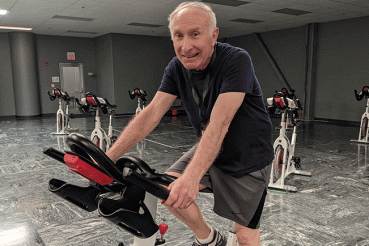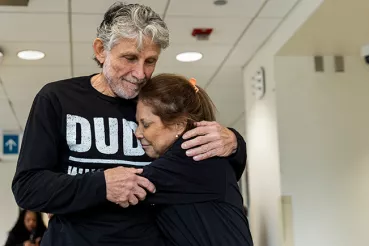I was first diagnosed with a hereditary kidney disease called focal segmental glomerulosclerosis at the age of 20. I did in-center hemodialysis for five years as I finished college, worked full-time and traveled. In June 2009, I was blessed to receive my first kidney transplant at Rush with transplant surgeon Edward Hollinger, MD, PhD.
After that, I went back to school to study nursing. Then, in March 2013, my transplanted kidney rejected — and I had to start hemodialysis again. At that point, I only had two months left before I graduated nursing school, and I did not know how I was going to make it. Somehow, though, I did.
After I passed my nursing board exam, I got a job at a hospital and worked the night shift from 7 p.m. to 7 a.m. When my shift was over, I went straight to dialysis. Then I headed home to get some sleep and then back to work by 7 p.m.
After three years on hemodialysis, I was blessed again in January 2016 with a second kidney transplant at Rush with transplant surgeon Stephen Jensik, MD.
Since the transplant, things have been going very well. And, believe it or not, I am now a dialysis nurse — and I’m able to give back to those whose shoes I was once in, while also doing something I am truly passionate about.
Staying strong
Over the last 17 years, I’ve had my share of surgeries, hospitalizations, scares, setbacks and worries. So what inspired and motivated me to keep going forward? Strong will and being an advocate for myself.
I had to make a choice in my life: continue living my life or just settle. And I chose to continue living.
I’ve always been a determined person. But once I started dialysis, that kicked into overdrive. I began setting goals, which gave me things to look forward to and motivated me to keep going. I knew I wanted to finish school, have a career, travel and stay as healthy as possible. I also made an effort to not allow dialysis to consume or define my life; instead, I made it just one part of my life.
I used to compare myself to others my age in regards to where they were in life with careers, children and overall freedom. But I had to stop and realize that their story was not mine.
I also maintained a positive attitude, mindset and faith in God. I never wanted anyone to feel sorry for me. Many people have a dialysis patient “stereotype”: they are always tired, can’t work, can’t do this, can’t do that. But that wasn’t me. I was able to do all those things. Yes, it took a little bit more planning, but it was doable.
Dialysis was new to me so I had to do some research and educate myself. I also learned how to work with my dialysis and Rush transplant team — including Hollinger, Jensik and my post-transplant nurses, Linda Murphy and Jessica VanAaslt — to my advantage.
My family and friends also provided me with an amazing support system. They always encouraged me, pushed me and rooted for me.
I encourage anyone who has kidney disease to continue to live your life, be a self-advocate and help to keep yourself healthy by working with your health care team. If you are on a transplant list, you just never know when you’ll get that life-changing call.




